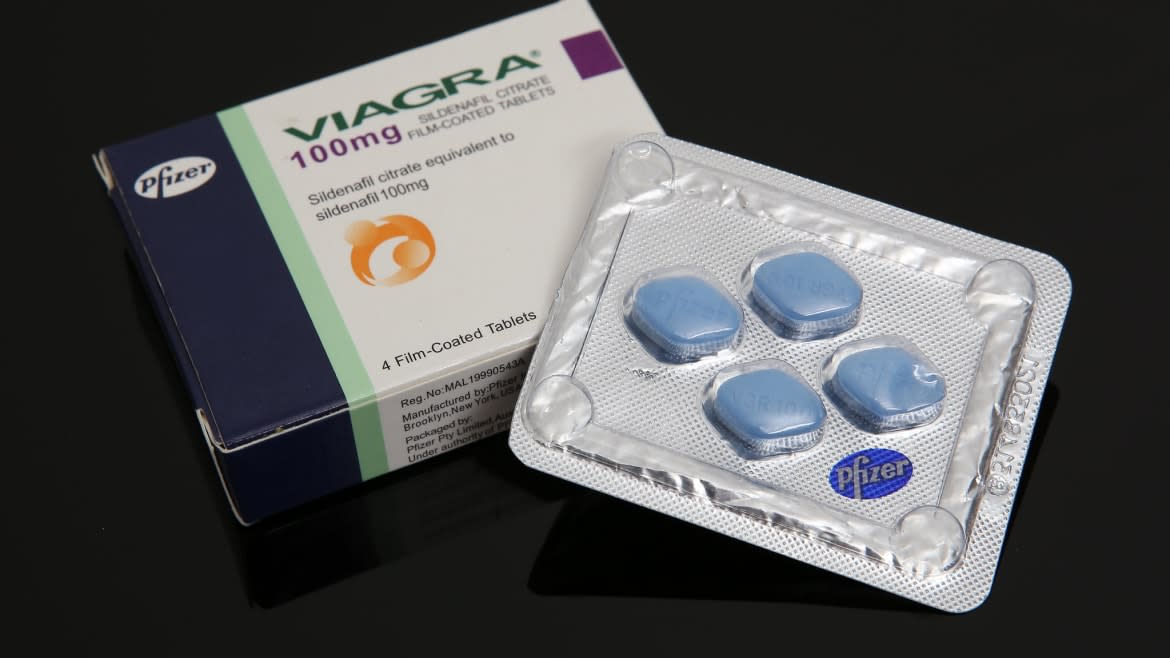Viagra Shows Surprising Promise In Reducing Alzheimer’s Risk

Viagra, the best-known drug to treat erectile dysfunction, is linked to a lower risk of Alzheimer’s. Seriously.
According to a new study published Monday in the journal Nature Aging, sildenafil—the generic name for Viagra—was associated with a 69 percent reduced incidence of Alzheimer’s in a large-scale analysis of more than 7 million patients.
It should be stated upfront that this study is not establishing a causal link between sildenafil and reduced Alzheimer’s risk; it simply suggests there’s a significant relationship that should be explored through actual clinical testing. But the findings are nevertheless a pleasant surprise, and the latest in a string of recent studies that highlight the potential of using old drugs to treat inscrutable diseases.
“Before this study, we didn’t expect we would identify sildenafil” as a drug candidate for treating Alzheimer’s, said Feixiong Cheng, a researcher at the Cleveland Clinic and the lead author of the new study.
A 50-Year-Old Drug Might Find a New Life Treating Alzheimer’s
Alzheimer’s is expected to afflict more than 13.8 million Americans by 2050, which means it’s critical to start identifying new cost-effective therapies that could improve the lives of patients or even prevent the disease from progressing in the first place.
One untapped source of new treatments could be existing drugs that are inexpensive to make and have tolerable known side effects. Cheng and his colleagues began their study as a screening of more than 1,600 FDA-approved drugs used to treat other diseases and conditions. They focused their search on drugs that target the buildup of beta amyloid and tau proteins in the brain—a distinctive sign of Alzheimer’s that leads to neurodegenerative changes.
This screening pinpointed a few drugs with the potential to reverse these protein buildups, and sildenafil (which in addition to erectile dysfunction is also sometimes prescribed to treat hypertension) emerged as the best candidate. Cheng and his colleagues found several animal studies that previously noted sildenafil might mitigate Alzheimer’s, and they also ran lab tests on human brain cells that proved out the drug’s anti-tau effects.
In the final leg of the study, the authors went over a huge database of more than 7 million Alzheimer’s patients to see whether past and current sildenafil users already experienced better disease outcomes. They found that sildenafil users were 69 percent less likely to develop Alzheimer’s than non-users over the course of six years. Sildenafil was also associated with lower Alzheimer’s rates than drugs like losartan and metformin that are already being studied in Alzheimer’s clinical trials.
We Just Got a Lot Closer to Finding a Cure for Alzheimer’s
Encouraging stuff, but for obvious reasons, it’s mostly men who are taking sildenafil. Controlled trials looking at the effects across genders are necessary before we can start rebranding the little blue pills as Alzheimer’s drugs.
Luckily, Cheng is already making plans for a Phase II trial to test the clinical benefits of sildenafil in early Alzheimer’s patients. (A Phase I trial can be skipped since the drug’s safety is already well known.)
Cheng added that it’s unlikely we’d see sildenafil being prescribed just on its own. “As Alzheimer’s is a complex disease caused by many factors, multi-target drugs or combination therapy targeting multiple disease pathways may offer better clinical benefits,” he said. More likely than not, we’d see sildenafil being used in combination with other treatments.
Get our top stories in your inbox every day. Sign up now!
Daily Beast Membership: Beast Inside goes deeper on the stories that matter to you. Learn more.


